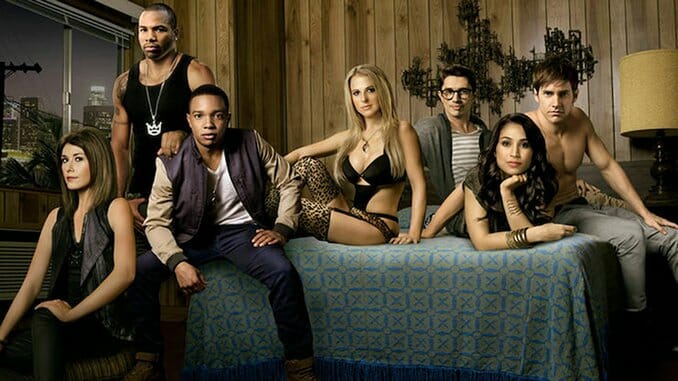ICYMI: The L.A. Complex Was a Great, Modern (Canadian) Spin on Melrose Place That No One Watched
Photo Courtesy of The CW
Between 2009 and 2012, The CW technically rebooted Melrose Place twice. First, there was the obvious one: the one-season flop known as Melrose Place 2.0, the official modern-day, next-generation revival of the original series, in the same vein of The CW’s 90210. (And I’ll admit it: I loved it.) A couple of years later, The CW basically tried it again with brand new intellectual property: The L.A. Complex, a two-season flop that was developed by creator/showrunner Martin Gero (Blindspot, The Lovebirds) and Linda Schuyler (co-creator of the Degrassi franchise).
The L.A. Complex followed a cast of struggling (and predominantly Canadian, in-story as well as in reality) twentysomethings living at The Deluxe Motel (aka “The Lux,” the titular complex) in Los Angeles, all hoping to make it big—or make it at all—in their chosen fields. The characters that The L.A. Complex focused on (at least in its first season) were:
- Aspiring actress Abby (Cassie Steele), the naive new girl fresh off the bus from Toronto.
- Connor (Jonathan Patrick Moore), the successful-but-tortured—in a way that actually succeeded, as opposed to being as corny as it sounds— Australian heartthrob actor suffering from severe depression.
- “Nice Guy” Nick (Joe Dinicol), a Calgary native whose choice to pursue stand-up comedy ended up proving just how little life experience and comedic perspective he really had. (It also allowed for real-life Paul F. Tompkins and Mary Lynn Rasjkub—as themselves—to clown on him for the good of all who watched the series.)
- The jaded Raquel (Jewel Staite, who would truly be reason enough to watch the show even if the rest of it wasn’t good), a Halifax actress who starred in a beloved, successful, now-canceled series (“It had a bad time slot.”) but can’t catch a break to save her life now that she’s 30 years old and every project she wants ends up going in “a different direction.”
- Regina native Alicia (Chelan Simmons), an aspiring dancer who keeps failing at making it, despite her obvious talent.
- Montreal’s Tariq (Benjamin Charles Watson), the music intern with a dream of becoming a hip-hop producer.
- Kaldrick King (Andra Fuller), an Oakland-bred rapper who struggles both with his desire to stay relevant in the hip-hop world and with his closested homosexuality.
Unlike Melrose Place 2.0, The L.A. Complex never quite reached the melodramatic highs that were Ashlee Simpson’s crazy eyes, Stephanie Jacobsen’s character’s med student-slash-sex worker storyline, and literally everything Katie Cassidy did in that series. It was genuinely good—not “just good for a nighttime soap”— and managed to be sexy and fun without glamorizing or sugarcoating the struggle of wanting to make it in Hollywood.
Still, The L.A. Complex was certainly idealized and aspirational in some ways. Like the now-defunct Toronto band Whale Tooth serving as the house band of The Lux, and Abby as the obvious typical romantic comedy-style lead at times, who trips and falls at the worst possible moments and gets into misunderstandings that could have easily been resolved. (Steele, however, did carry the show well in this role, though it was also for the best it was an ensemble.)
But unlike Melrose Place 2.0—and early Melrose Place, which is why it was for the best it pivoted to soapy chaos once it did—there’s an actual investment in the hopes and dreams of the characters, as well as a belief that they exist for more than just wanting to be rich and famous. (Even the Nick character, an unfunny comedian.) The L.A. Complex was able to tell these lofty stories as truthfully as it possibly could without being too naturalistic, and as dynamic as it could without being too far-fetched or over-the-top. There was a balance that made the series impressive from the beginning.
The lack of After School Special-ness in its storytelling was also refreshing: One of the most understated moments of the pilot is when Abby is offered ecstasy at a party at The Lux and just casually accepts it, with no need for the show to weigh the pros and cons of it for an entire episode (unlike Melrose Place or even the “sexier” Melrose Place 2.0). That also brings up a very good point about the series overall: It holds up really well in 2020, which is something we all kind of have to check these days; it’s simply not something a lot of shows from that era do. Many tend to not hold up well even right after their run.
-

-

-

-

-

-

-

-

-

-

-

-

-

-

-

-

-

-

-

-

-

-

-

-

-

-

-

-

-

-

-

-

-

-

-

-

-

-

-

-








































